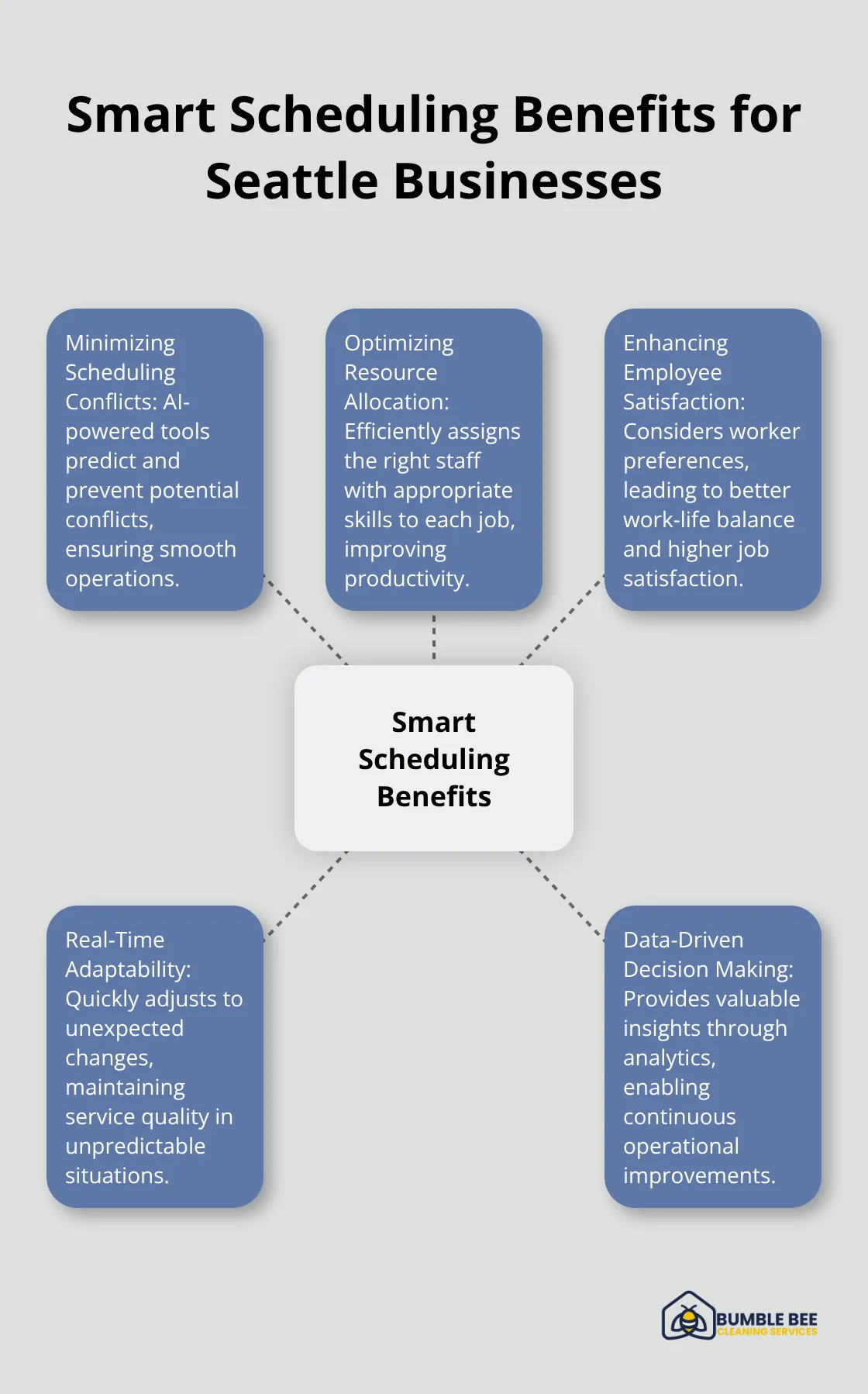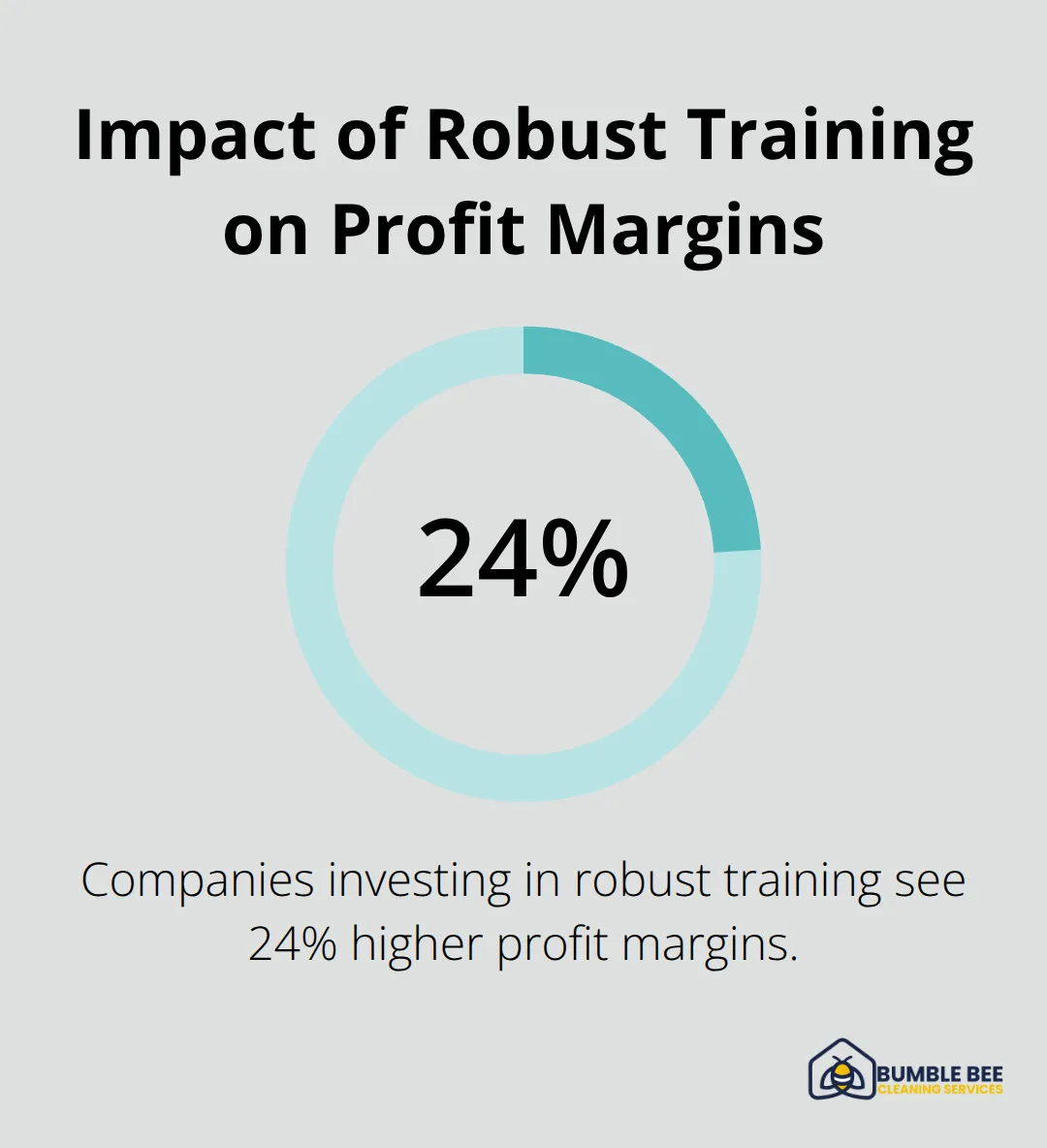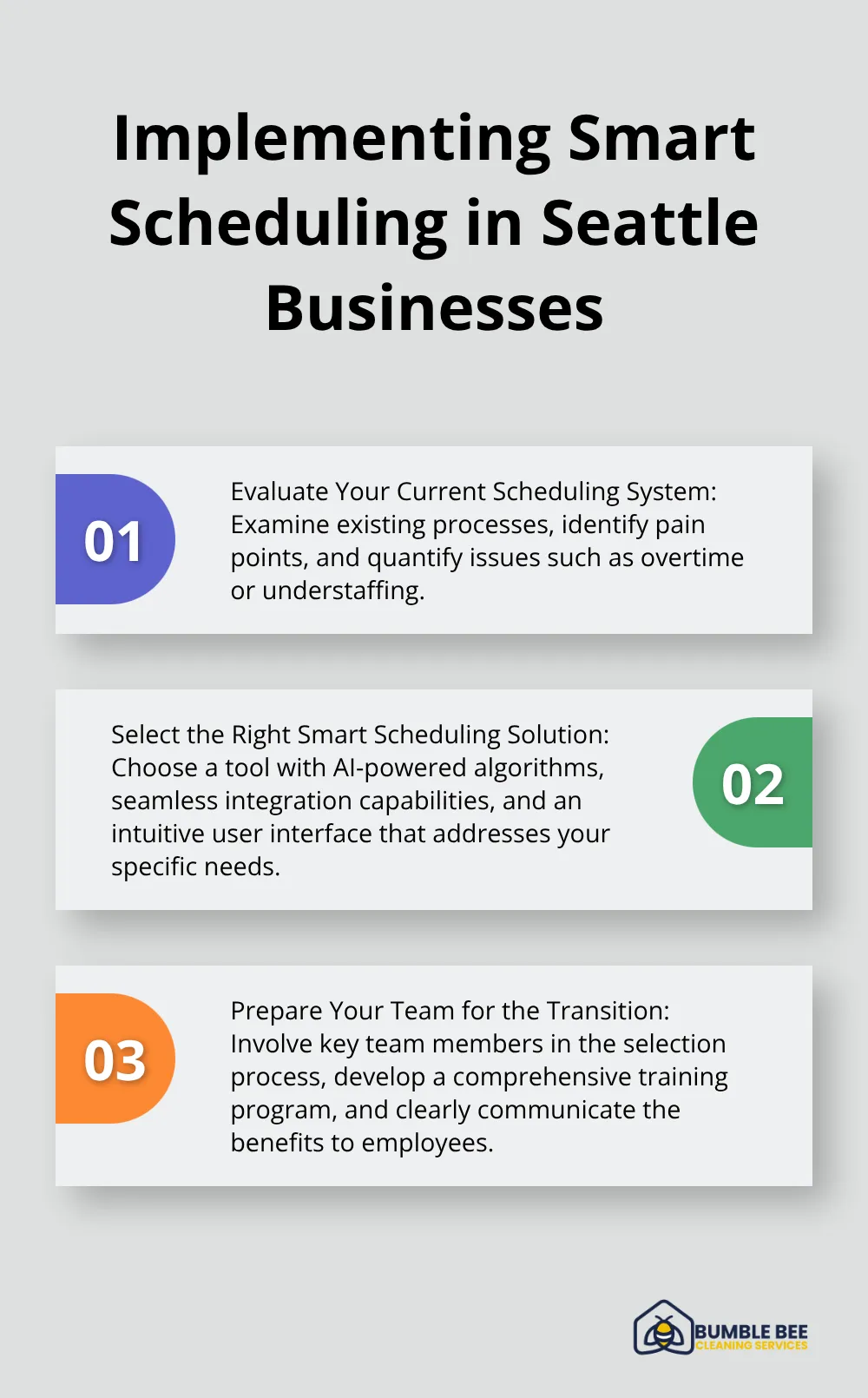At Bumble Bee Cleaning Services, we’ve seen firsthand how smart scheduling can transform business operations in Seattle. Janitorial scheduling, in particular, has become a game-changer for companies looking to boost productivity and efficiency.
Smart scheduling tools are revolutionizing the way Seattle businesses manage their time and resources. In this post, we’ll explore why these innovative solutions are essential for companies aiming to stay competitive in today’s fast-paced market.
How Smart Scheduling Boosts Business Efficiency in Seattle
Minimizing Scheduling Conflicts
Smart scheduling transforms the way Seattle businesses manage their operations. These innovative tools use AI scheduling assistants to analyze patterns and predict potential conflicts before they occur. This proactive approach allows companies to address issues in advance, which ensures smooth operations and consistent service delivery. (For example, a cleaning company can avoid double-bookings or understaffed shifts, which often cause stress for both employees and managers.)
Optimizing Resource Allocation
Smart scheduling doesn’t just assign shifts; it optimizes how resources are allocated across the board. For janitorial services, this means the right number of staff with the appropriate skills are present for each job. The system takes into account factors such as the size of the space, specific cleaning requirements, and even individual employee strengths to create the most efficient schedule possible. This level of optimization leads to improved productivity and cost savings for businesses.
Enhancing Employee Satisfaction
One of the most significant benefits of smart scheduling is its positive impact on employee satisfaction. These systems consider employee preferences and availability, which creates schedules that better align with workers’ lives. This alignment leads to improved work-life balance, reduced stress, and ultimately, higher job satisfaction. Happy employees provide better service, which creates a positive cycle for businesses and their staff.

Real-Time Adaptability
Smart scheduling tools offer real-time adaptability, a feature that proves invaluable in the dynamic business environment of Seattle. These systems can quickly adjust to unexpected changes, such as last-minute client requests or employee absences. This flexibility ensures that businesses can maintain their service quality even in unpredictable situations. (Imagine a cleaning service that can instantly reassign tasks when an employee calls in sick, without disrupting the day’s schedule.)
Data-Driven Decision Making
Smart scheduling platforms provide valuable insights through data analytics. Businesses can track patterns in scheduling efficiency, employee performance, and client satisfaction. This data-driven approach allows companies to make informed decisions about staffing levels, training needs, and service offerings. As a result, businesses can continuously improve their operations and stay competitive in Seattle’s fast-paced market.
Smart scheduling isn’t just a luxury; it’s becoming a necessity for businesses that want to thrive in Seattle’s dynamic market. These tools pave the way for increased productivity and growth by reducing conflicts, optimizing resources, and boosting employee satisfaction. The next section will explore the key features of smart scheduling tools that make these benefits possible for Seattle businesses.
What Makes Smart Scheduling Tools Essential for Seattle Businesses?
Smart scheduling tools have transformed the way Seattle businesses operate. These advanced systems offer features that go beyond simple calendar management, providing a comprehensive solution for optimizing workforce management and operational efficiency.
AI-Powered Scheduling Algorithms
The core of any smart scheduling tool is its AI-powered algorithm. These sophisticated systems analyze vast amounts of data to create optimal schedules. They consider factors such as employee skills, availability, and preferences, as well as business demands and historical patterns. This results in schedules that meet operational needs and boost employee satisfaction.
Deloitte reports that AI-powered applications like Skills Cloud can help business leaders understand their labor costs and optimize the right blend of contingent and permanent workforce. This can lead to significant savings for Seattle businesses, especially in industries with fluctuating demand (like retail or hospitality).
Seamless Integration with Existing Systems
Modern smart scheduling tools excel at integrating with other business systems. This integration eliminates data silos and provides a more holistic view of operations. A scheduling tool can pull data from HR systems to ensure compliance with labor laws and company policies. It can also integrate with payroll systems to streamline time tracking and wage calculations.
Mobile Accessibility and Real-Time Updates
In today’s fast-paced business environment, accessing and updating schedules on-the-go is crucial. Smart scheduling tools offer mobile apps that allow managers and employees to view and manage schedules from anywhere, at any time. This feature proves particularly valuable for businesses with remote or field-based workers (such as cleaning services or maintenance companies).
Real-time updates are another game-changing feature. When changes occur, such as a last-minute shift swap or an unexpected absence, the system instantly updates the schedule and notifies all affected parties. This level of agility helps businesses adapt quickly to changes and maintain smooth operations.
As we move forward, it’s clear that implementing these powerful tools requires careful consideration and planning. The next section will explore the steps Seattle businesses can take to successfully adopt smart scheduling solutions and maximize their benefits.
How to Implement Smart Scheduling in Seattle Businesses
Evaluate Your Current Scheduling System
Start with a thorough examination of your existing scheduling processes. Identify pain points such as frequent overtime, understaffing, or excessive manager time spent on scheduling. Quantify these issues where possible. (For example, if managers spend 10 hours a week on scheduling, that’s 520 hours annually which could be redirected to more strategic tasks.)
Select the Right Smart Scheduling Solution
When you choose a smart scheduling tool, prioritize features that address your specific needs. Look for AI-powered algorithms that can handle complex scheduling scenarios, especially if you operate in industries with variable demand like retail or hospitality. Ensure the solution integrates seamlessly with your existing HR and payroll systems to maximize efficiency.
Consider the user interface carefully. Choose a solution with an intuitive design to minimize the learning curve for your team.
Prepare Your Team for the Transition
The introduction of new technology often faces resistance. To overcome this, involve key team members in the selection process.
Develop a comprehensive training program. Include hands-on sessions, video tutorials, and a dedicated support team. Companies that invest in robust training see 24% higher profit margins, according to recent studies.
Set clear expectations about how the new system will be used. Communicate the benefits to employees, such as fairer shift distribution and easier time-off requests. When staff understand the personal advantages, they’re more likely to embrace the change.

Monitor and Optimize
After implementation, closely track key performance indicators. These might include reduction in scheduling conflicts, decrease in overtime hours, or improvement in employee satisfaction scores. Use this data to fine-tune your scheduling processes and demonstrate ROI to stakeholders.
Implementing smart scheduling is not a one-time event but an ongoing process of improvement. Regular check-ins with your team can provide valuable insights for continual optimization. (This approach allows you to address any issues promptly and refine the system based on real-world usage.)

Final Thoughts
Smart scheduling transforms Seattle businesses by optimizing workforce management and operations. These tools minimize conflicts, allocate resources efficiently, and boost employee satisfaction, leading to significant productivity improvements. Real-time adaptability and data-driven insights empower companies to make informed decisions and maintain a competitive edge in Seattle’s dynamic market.
As technology advances, we anticipate more sophisticated features in scheduling tools. Machine learning algorithms will offer predictive capabilities, anticipating business needs before they arise. Augmented reality integration could provide new ways to visualize and manage schedules, further streamlining operations.
We encourage Seattle businesses to explore smart scheduling options, including janitorial scheduling tools. The initial investment will yield long-term benefits in reduced costs and improved efficiency. For expert insights on implementing efficient scheduling systems, contact Bumble Bee Cleaning Services. Our experience in providing top-rated cleaning solutions has shown us the value of smart scheduling in delivering exceptional service.
